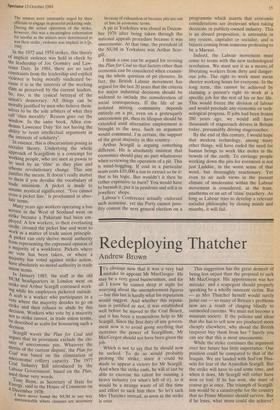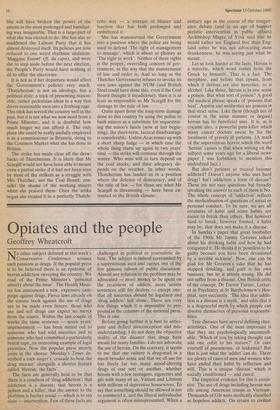Redeploying Thatcher
Andrew Brown
IVs obvious now that it was a very bad mistake to appoint Mr MacGregor. He may be a very good businessman, and for all I know he cannot sleep at night for worrying about the unemployment figures — but this last is hardly what his reputation would suggest. And whether this reputa- tion is justified or not, it was established well before he moved to the Coal Board, and it has been a tremendous help to Mr Scargill. Since the first duty of any govern- ment now is to avoid going anything that increases the power of Scargillism, Mr MacGregor should not have been given the job.
Which is not to say that he should now be sacked. To do so would probably prolong the strike, since it could be made to appear a victory for Mr Scargill. And when the strike ends, he will at last be able to exercise his talent for running a heavy industry (or what's left of it), so it would be a strange waste of all this time and effort to sack him then. So let's sack Mrs Thatcher instead, as soon as the strike is over. This suggestion has the great demerit of being less unjust than the proposal to sack Mr MacGregor. His appointment was her mistake, and a scapegoat should properly speaking be a wholly innocent victim. But — as Mrs Thatcher herself would surely point out — so many of Britain's problems now are a result of clinging blindly to outmoded customs. We must not become a museum society. If the policies and ideas that she has to sell now are produced more cheaply elsewhere, why shoud the British taxpayer buy them from her ? Surely you can see that this is most uneconomic.
While the strike continues the argument over her future has little importance. Our position could be compared to that of the Iraquis. We are landed with Sod'em Hus- sein for fear of the Ayatollah Scargill. But the strike will have to end some time, and when it does, Mr Scargill will either have won or lost. If he has won, she must of course go at once. The triumph of Scargill- ism would be a catastrophe for the country that no Prime Minister should survive. But if he loses, what more could she achieve?
She will have broken the power of the unions in the most prolonged and humiliat- ing way imaginable. That is a large part of what she was elected to do. She has also so maddened the Labour Party that it has almost destroyed itself. Its policies are now reduced to one weird rhythmic ululation: `Maggaye Eouwt' (ff, da capo), and were she to step aside before the next election, the People's Party would have nothing at all to offer the electorate.
It is not as if her departure would affect the Government's policies very much. `Thaticherism' is not an ideology, but a political style: a trick of presenting reason- able, rather pedestrian ideas in a way that drives reasonable men into a frothing rage. This trick has served the country well in the past, but it is not what we now need from a Prime Minister, and it is doubtful how much longer we can afford it. The only place she could be really usefully employed is as a commissioner in Brussels, doing to the Common Market what she has done to Britain.
The strike has made clear all the draw- backs of Thatcherism. It is likely that Mr Scargill would not have been able to mount even a partial strike if it had not been seen by most of the strikers as a struggle with Mrs Thatcher, not the Coal Board; con- sider the shame of the working miners when she praised them. Once the strike began she treated it in a perfectly Thatch- erite way — a mixture of bluster and inaction that has both prolonged and embittered it.
She has manoeuvred the Government into a position where the police are being used to defend 'The right of management to manage', which is about as phoney as 'The right to work'. Neither of these rights is the proper, overriding concern of gov- ernment, in the way that the maintenance of law and order is. And so long as the Thatcher Government refuses to invoke its own laws against the NUM (and British Steel could have done this, even if the Coal Board thought it injudicious), then it is at least as responsible as Mr Scargill for the damage to the rule of law.
Quite apart from the long-term damage done to this country by using the police to bash miners as a substitute for sequestrat- ing the union's funds (now at last begin- ning), the short-term, tactical disadvantage is considerable. Unless Acas comes up with a short sharp fudge — in which case the whole thing starts up again in two years' time — the strike will continue through the winter. Who wins will in turn depend on the coal stocks, and their adequacy de- pends on the weather. In other words, Thatcherism has landed us in a position where the defence of democracy, and of the rule of law — for these are what Mr Scargill is threatening — have been en- trusted to the British climate.























































 Previous page
Previous page